|
|
|
Sort Order |
|
|
|
Items / Page
|
|
|
|
|
|
|
| Srl | Item |
| 1 |
ID:
190980
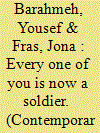

|
|
|
|
|
| Summary/Abstract |
In this article, we examine the use of war metaphors in Jordanian official discourse on the Covid-19 pandemic in 2020-21, through an analysis of videos of public statements and media releases made by Jordanian government officials at press conferences and interviews with local media outlets which were disseminated through social media. Against both the linguistic essentialism and the Western-centrism of conventional analyses of (war) metaphors, we demonstrate that Jordanian officials’ framing of Covid-19 as a security threat is not just a function of the rhetorical appeal of militarised discursive responses to the pandemic, but also aligns closely with existing ideologies of the militarisation and securitisation of public life. The mobilisation of metaphor in the context of the Covid-19 pandemic should thus be understood in relation to the specific discourses that pervade the communicative channels through which it is distributed.
|
|
|
|
|
|
|
|
|
|
|
|
|
|
|
|
| 2 |
ID:
190973
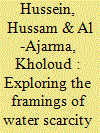

|
|
|
|
|
| Summary/Abstract |
Water scarcity in Palestine is a top national priority issue. Extensive research has analysed the causes of water scarcity in Palestine, focusing on negotiations, the occupation, climate change, environmental conditions, the role of international donors and funders, and mismanagement. Nevertheless, how these representations are reflected in Palestinian textbooks has not been investigated. However, textbooks are key because they reflect the governmental position and dominant discourses and forge future generations’ understandings of water issues. This paper takes textbooks as a case study to analyse the dominant discourses of water scarcity in Palestine.
|
|
|
|
|
|
|
|
|
|
|
|
|
|
|
|
| 3 |
ID:
190978
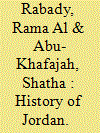

|
|
|
|
|
| Summary/Abstract |
The history of Jordan is an epistemological construction of the colonial past with Biblical archaeology at its core. At the same time, vernacular heritage is addressed by many foreign scholars as decaying, disappearing and accidental. This article takes issue with the foreign Biblical formation of the past and introduces local heritage-making as part of a decolonising construction. We debate the historical continuity of Biblical epistemology whilst proclaiming vernacular heritage as an accidental reality that is irrelevant to the ancient past. Local communities are introduced as active knowledge agents whose understanding of, and approach to, vernacular heritage can shift the epistemological debate on Jordan’s history and its relevance to the present and the future. This argument is anchored in case studies of the Biblical archaeology of Hisban and the local village of Gharisa, to investigate how each one functions in the absence/presence of the other. The comparison shows that while the Biblical epistemology applied in the case of Hisban precipitated a version of Jordan's history based on a spatio-political pattern of tribalism, local knowledge advanced a logic of modern history that included vernacular heritage as a link between the ancient past and the uncertain present and future in Jordan, and using Arabism, as opposed to tribalism, as a unifying framework.
|
|
|
|
|
|
|
|
|
|
|
|
|
|
|
|
| 4 |
ID:
190981


|
|
|
|
|
| Summary/Abstract |
This article investigates the socio-linguistic and pragmatic functions of Jordanian political humour after the Arab Spring revolutions from the perspective of Mikhail Bakhtin’s theory of carnival and the carnivalesque (folk humour). The analysis undertaken here of Jordanian political humour reveals a peculiar use of carnivalesque political humour via the use of humour as a socio-linguistic and pragmatic device that allows the ridicule of the government but not of the monarch. This occurs through the use of (1) conversational implicature, (2) rhetorical question, (3) malapropism, (4) taboo language and (5) reference and inference. This humour appears to be a form of ‘licensed disruption,’ an idea that is used extensively by some scholars of Bakhtin to talk about the popular politics of resistance and its limits and targets – what can and cannot be said within legal frameworks and societal expectations. Such humour, I found, has constantly called for reform of the government but not for regime change or revolution and has led to significant socio-political changes in Jordanian society, through which people are more willing to criticise and mock the government in social media platforms, such as Facebook.
|
|
|
|
|
|
|
|
|
|
|
|
|
|
|
|
| 5 |
ID:
190979
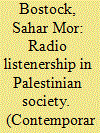

|
|
|
|
|
| Summary/Abstract |
This article examines the reception of radio in Palestinian Arab society from the 1930s until the 1948 war. The article breaks new ground by reconstructing the geographical distribution of radio sets throughout Mandate Palestine and analysing the practices of radio listening. The article argues that radio built on earlier forms of communication and entertainment and depended on existing cultural practices to reach Palestinian society. Radio listening often took place in public spaces and overlapped with the consumption of other media, such as communal newspaper reading. The impact of listening in public was twofold: first, access to radio was shaped by existing social and economic hierarchies and consequently reinforced them; second, public radio listening encouraged critical media reception and cultivated political debates. This way, Palestinians undermined the intentions of the colonial government and used radio for their own ends. By investigating the experiences of radio listeners in Palestine this article sheds light not only on the cultural life of Palestinian Arabs during the British Mandate, but also on the multi-layered, multi-directional workings of media in colonial contexts.
|
|
|
|
|
|
|
|
|
|
|
|
|
|
|
|
| 6 |
ID:
190975
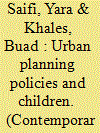

|
|
|
|
|
| Summary/Abstract |
This article undertakes a physical assessment of the outdoor environment of Israeli-administered kindergartens in East Jerusalem. It investigates their suitability to accommodate the proper development and growth of the Palestinian children who use them. Due to Israeli-imposed policies and laws and the lack of proper urban planning, scope for Palestinian growth and expansion in East Jerusalem is limited. This has resulted in a shortage of spaces, poor living conditions, and a lack of adequate facilities, including kindergartens. This assessment of 47 kindergartens’ outdoor environments, along with interviews with 9 teachers, shows that the spaces allocated for children in kindergarten playgrounds are small and do not meet the standards required to allow free play. Although the kindergartens studied are administered and licensed by Israeli laws and standards, the results show that the conditions in them do not provide safety, privacy, diverse types of play equipment, and the natural surroundings important for an outdoor play environment conducive to children’s development and learning.
|
|
|
|
|
|
|
|
|
|
|
|
|
|
|
|
| 7 |
ID:
190977


|
|
|
|
|
| Summary/Abstract |
Victorian travellers, explorers and scholars in the Levant produced a series of ethnographic observations of Palestine’s indigenous population essentially through biblical lenses. These perceptions sought ultimately to retrieve the biblical past in the context of the imperial present. At the same time, modern historiography about ancient Israel developed during the nineteenth and twentieth centuries. While the full-blown allochronism and Orientalism of the early modern Western visitors to Palestine have in recent decades been surpassed by more critical insights in the scholarly assessment of the region, some traits from that Victorian ethnographic and Bible-centred gaze still linger in contemporary historical constructions of ancient Palestine through the concept of ‘ancient Israel’, notably in the conceptualisation and periodisation of such a history.
|
|
|
|
|
|
|
|
|
|
|
|
|
|
|
|
|
|
|
|
|